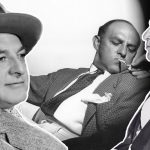In the 1940s, movie star Veronica Lake became one of the biggest celebrities in the world for a short time thanks to hits like Sullivan’s Travels and The Blue Dahlia. The actress had been pushed into show business at the behest of her mother after the tragic death of her father at the age of only 10. Despite the fast success Veronica found in Hollywood, tragedy would continue to follow her over the course of her life. Her fame didn’t last long, and she spent her final years in drug-induced squalor. Join Facts Verse as we explore Veronica Lake’s tragic story.
Veronica Lake was born on November of 1919 in New York. At the time of her birth, she became known as Constance. It wouldn’t be until the early days of Veronica’s Hollywood career that she would take her more iconic stage name. Her father worked for an oil company and, when she was only 10 years old, he died in a tragic accident. After the death of Veronica’s father, her mother remarried. Around this time, she got the idea to get Veronica involved in show business.
As a child, Veronica didn’t have much interest in performing. However, even she got push into the entertainment industry at the behest of her mother. Veronica’s mother moved the family to Florida, where she got her daughter involve in the local beauty pageant scene. Veronica proved successful in the local contestants, and it inspired her mother to set her sights on Hollywood fame next. The family then moved out to California, where Veronica began studying acting and auditioning for film roles to please her mother.
Veronica Lake’s Film Appearance
Veronica Lake’s first appearance in a feature film came in 1939, with a small role in a movie named Sorority House. At the time, Veronica was going by the name of Constance Keane, with Keane being the last name of the man that her mother had remarried after the death of her father. Following Veronica’s first feature film role, she could be in similarly small roles in the features All Women Have Secrets and Dancing Co-Ed.
After Veronica’s initial small roles in the late 1930s, she could be part in two feature films in 1940. These films were Forty Little Mothers and Young as You Feel. However, the star’s rise to success wouldn’t come until a year later, along with her transition to her more famous stage name. In 1941, the same year that her two first big hits release, Veronica got married for the first time. She married an art director named John Detlie and gave birth to a daughter the same year. 1941 proved an exceptionally big year for Veronica, as she also received her first big film roles.
Veronica’s first big film role came in 1941’s I Wanted Wings. Veronica starred in the picture alongside William Holden, and it marked the debut of her new stage name. Producer Arthur Hornblow Jr., who helped Veronica rise through the ranks at Paramount Pictures, suggested the name “Veronica Lake”. With her new name, Veronica became a giant star! Following the success of I Wanted Wings, Veronica is also part in the equally successful Sullivan’s Travels the same year. It seemed that Veronica set to become one of the decade’s biggest stars, though her fame sadly wouldn’t last.
Veronica’s Big Breakout Role
After Veronica Lake’s big breakout roles in 1941, she became one of the 1940s’ biggest stars. She could be part in such features as This Gun for Hire, I Married a Witch, and The Glassy Key the following year, all of which became big successes at the box office. In 1943, she appeared in the film So Proudly We Hail! The film was one of the actress’s biggest successes yet. By this point in time, it seemed that the sky was the limit for Veronica Lake. However, some unfortunate events after this would bring her career to a halt, and also cause problems in her personal life.
Near the end of 1942, Veronica had become pregnant with a second child. The child was born prematurely in July of 1943, and died only a week later. The event was incredibly traumatic for Veronica, and her first marriage would end up dissolving by the end of the year.
In addition to these personal troubles, 1944 also saw Veronica receive some negative attention for her allegedly poor performance in the film The Hour Before Dawn, which was a World War II film in which she depicted a Nazi sympathizer. If you’re enjoying this video so far, be sure to hit the like button to show your support! Also, subscribe to the channel if you’d like to be among the first to know when more Facts Verse videos are on their way!
According to film critics, Veronica Lake’s German accent in the film The Hour Before Dawn wasn’t very convincing. After a series of successes, this performance marked Veronica’s first major failure in Hollywood. Paramount Pictures would subsequently lose a little bit of their confidence in the actress, and began casting her in projects that didn’t take full advantage of her talents. Some of the actress’s other misfires during the period included her performances in the films Hold That Blonde and Out of This World.
Veronica Lake’s Facing Personal Trouble
Although Veronica Lake’s career was on a downward trajectory, she had one last big hit in 1946 with the film The Blue Dahlia. Featuring alongside Alan Ladd, Veronica’s performance arguably became the biggest success of her career. Veronica Lake was one of the only actresses that could make the relatively short Alan Ladd look tall on the screen. Alan Ladd was 5’ 6”, which made him much shorter than the average Hollywood actor. However, Veronica Lake was 4’ 11”, which made him look tall by comparison.
Even though Veronica Lake made him look taller on the screen, Alan Ladd apparently didn’t get along well with his female costar on the set of The Blue Dahlia. In fact, it seems that Veronica had a hard time getting along with any of her costars, and her reputation for being difficult to work with arguably didn’t help her career very much. This poor reputation likely played a part in Paramount Pictures gradually giving the actress less respectable work.
After her divorce from her first husband near the end of 1943, Veronica Lake married second husband Andre De Toth in 1944. The couple had a child in 1945, and another in 1948. The same year, Veronica let go from her contract with Paramount Pictures after a number of failures. After the death of her second child, Veronica’s mental health suffered and she began seeking increasing solace in alcohol. Because of this, her second marriage wasn’t the healthiest.
Her Second Marriage
Veronica Lake’s second husband could apparently be violent towards her, and this likely didn’t help the actress’s increasing mental troubles. Veronica’s second marriage wasn’t doing well, and neither was her career. After being let go by Paramount Pictures in 1948, Veronica worked for some time with 20th Century Fox. This partnership yielded the largely unsuccessful films Slattery’s Hurricane and Stronghold. By the 1950s, Veronica’s career was over.
1951 saw Veronica Lake file for bankruptcy, and she went on to divorce second husband Andre the following year. A few years later, Veronica tried marriage for a third time. Veronica’s third husband was a songwriter by the name of Joseph A. McCarthy, though their marriage only lasted from 1955 until 1959. The same year of their divorce, Veronica suffered an ankle injury, which caused her to lose work. If she had entered into the 1950s with greatly diminished star status, she entered into the 1960s in even more dire straits.
Veronica’s Broadway Production Career
Early into the 1960s, Veronica attempted to revive her career by performing on the stage. She could be in the off-Broadway production Best Foot Forward, starring alongside Liza Minnelli. However, Veronica’s attempts to become a stage actress didn’t prove incredibly successful. The more she failed in her career, the more she turned to the bottle to quell her pain. She was arrested for public drunkenness several times, and eventually retreated from the spotlight.
Years after her attempted off-Broadway career revival, a newspaper piece was published depicting Veronica’s life of squalor during the mid-1960s. The actress was apparently living in a hotel at the time and working as a Manhattan cocktail waitress. The article was a success, and led to a minor career revival for the actress. She began getting some work on television. And even returned to film in 1966 with the movie Footsteps in the Snow.
Capitalizing on the attention that she had begun receiving; Veronica Lake published an autobiography during the late 1960s that ended up selling fairly well. She used the money from the book to fund a vanity project by the name of Flesh Feast. The 1970 horror film was Veronica’s attempt to make it back into the entertainment industry. But it ended up being a failure. After the failure of Flesh Feast, Veronica moved to England for a period of time, where she met and married her fourth and final husband. This husband was a man by the name of Robert Carleton-Munro. The marriage was incredibly short-lived, and Veronica was back in America by 1973. Later the same year, she passed away.
Veronica Lake Death
During Veronica’s time in England, her physical and mental states had worsened considerably. She ended up passing away in July of 1973, dying from hepatitis. Veronica Lake was only 54 years old at the time of her death. Not many people were said to be in attendance at her Manhattan funeral. Although Veronica died without much fanfare, she remains recognized as a prominent Golden Age actress.
Veronica Lake may have only been a famous star for around a decade, but it was long enough for her to leave a permanent impression on the entertainment industry. Now it’s time to hear from you: did you know that Veronica Lake was pushed into show business at the behest of her mother, and that she was married five times during her 53 years? As always, like this video to show your support, and subscribe and hit the notification bell if you’d like to be among the first to know when more Facts Verse videos are on their way!


